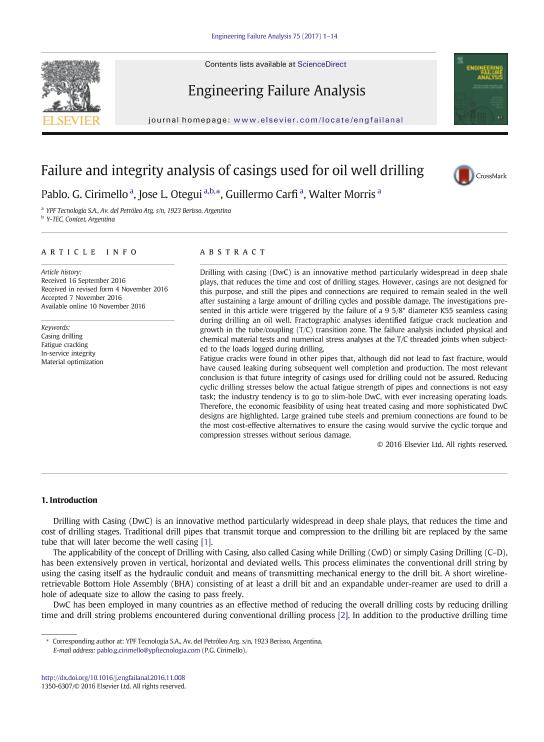Artículo
Failure and integrity analysis of casings used for oil well drilling
Fecha de publicación:
05/2017
Editorial:
Pergamon-Elsevier Science Ltd
Revista:
Engineering Failure Analysis
ISSN:
1350-6307
Idioma:
Inglés
Tipo de recurso:
Artículo publicado
Clasificación temática:
Resumen
Drilling with casing (DwC) is an innovative method particularly widespread in deep shale plays, that reduces the time and cost of drilling stages. However, casings are not designed for this purpose, and still the pipes and connections are required to remain sealed in the well after sustaining a large amount of drilling cycles and possible damage. The investigations presented in this article were triggered by the failure of a 9 5/8″ diameter K55 seamless casing during drilling an oil well. Fractographic analyses identified fatigue crack nucleation and growth in the tube/coupling (T/C) transition zone. The failure analysis included physical and chemical material tests and numerical stress analyses at the T/C threaded joints when subjected to the loads logged during drilling. Fatigue cracks were found in other pipes that, although did not lead to fast fracture, would have caused leaking during subsequent well completion and production. The most relevant conclusion is that future integrity of casings used for drilling could not be assured. Reducing cyclic drilling stresses below the actual fatigue strength of pipes and connections is not easy task; the industry tendency is to go to slim-hole DwC, with ever increasing operating loads. Therefore, the economic feasibility of using heat treated casing and more sophisticated DwC designs are highlighted. Large grained tube steels and premium connections are found to be the most cost-effective alternatives to ensure the casing would survive the cyclic torque and compression stresses without serious damage.
Archivos asociados
Licencia
Identificadores
Colecciones
Articulos(SEDE CENTRAL)
Articulos de SEDE CENTRAL
Articulos de SEDE CENTRAL
Citación
Cirimello, Pablo. G.; Otegui, Luis Jose; Carfi, Guillermo; Morris, Walter; Failure and integrity analysis of casings used for oil well drilling; Pergamon-Elsevier Science Ltd; Engineering Failure Analysis; 75; 5-2017; 1-14
Compartir
Altmétricas




